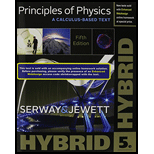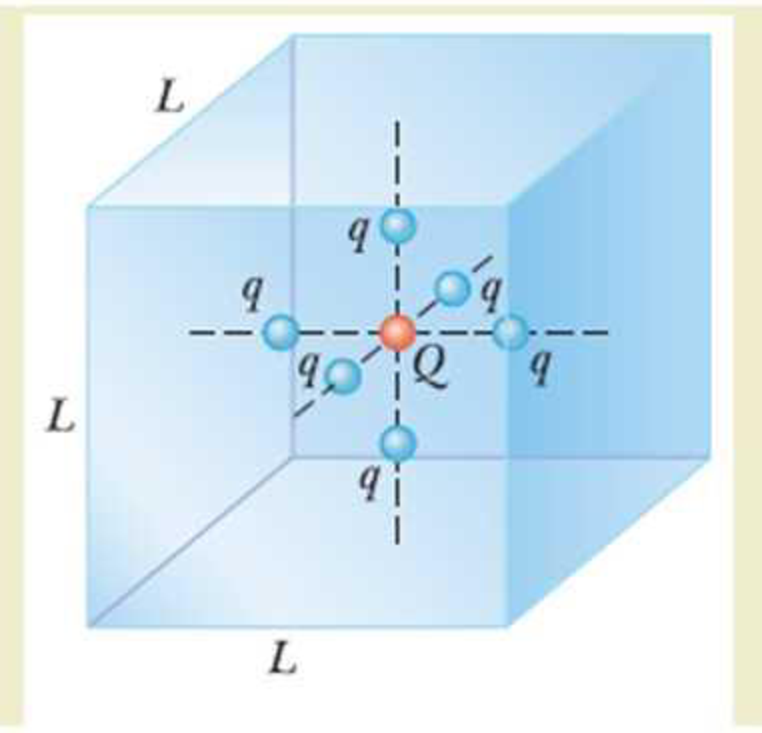
Principles of Physics: A Calculus-Based Text, Hybrid (with Enhanced WebAssign Printed Access Card)
5th Edition
ISBN: 9781305586871
Author: Raymond A. Serway, John W. Jewett
Publisher: Cengage Learning
expand_more
expand_more
format_list_bulleted
Concept explainers
Textbook Question
Chapter 19, Problem 41P
A particle with charge Q = 5.00 µC is located at the center of a cube of edge L = 0.100 m. In addition, six other identical charged particles having q = –1.00 µC are positioned symmetrically around Q as shown in Figure P19.41. Determine the electric flux through one face of the cube.

Expert Solution & Answer
Want to see the full answer?
Check out a sample textbook solution
Students have asked these similar questions
Please solve and answer the question correctly please. Thank you!
help and explain how to get the answer
explain how to find the answer
Chapter 19 Solutions
Principles of Physics: A Calculus-Based Text, Hybrid (with Enhanced WebAssign Printed Access Card)
Ch. 19.2 - Three objects are brought close to one another,...Ch. 19.3 - Three objects are brought close to one another,...Ch. 19.4 - Object A has a charge of +2 C, and object B has a...Ch. 19.5 - A test charge of +3 C is at a point P where an...Ch. 19.6 - Rank the magnitudes of the electric field at...Ch. 19.9 - If the net flux through a gaussian surface is...Ch. 19.9 - Consider the charge distribution shown in Active...Ch. 19 - A point charge of 4.00 nC is located at (0, 1.00)...Ch. 19 - Charges of 3.00 nC, 2.00 nC, 7.00 nC, and 1.00 nC...Ch. 19 - An object with negative charge is placed in a...
Ch. 19 - A particle with charge q is located inside a...Ch. 19 - Prob. 5OQCh. 19 - Prob. 6OQCh. 19 - Rank the electric fluxes through each gaussian...Ch. 19 - A circular ring of charge with radius b has total...Ch. 19 - Two solid spheres, both of radius 5 cm, carry...Ch. 19 - An electron with a speed of 3.00 106 m/s moves...Ch. 19 - A very small ball has a mass of 5.00 103 kg and a...Ch. 19 - In which of the following contexts can Gausss law...Ch. 19 - Two point charges attract each other with an...Ch. 19 - Three charged particles are arranged on corners of...Ch. 19 - Assume the charged objects in Figure OQ19.15 are...Ch. 19 - A uniform electric field exists in a region of...Ch. 19 - Prob. 2CQCh. 19 - If more electric field lines leave a gaussian...Ch. 19 - Prob. 4CQCh. 19 - Prob. 5CQCh. 19 - Prob. 6CQCh. 19 - Prob. 7CQCh. 19 - A cubical surface surrounds a point charge q....Ch. 19 - Prob. 9CQCh. 19 - Prob. 10CQCh. 19 - Prob. 11CQCh. 19 - Prob. 12CQCh. 19 - Prob. 13CQCh. 19 - Prob. 14CQCh. 19 - A common demonstration involves charging a rubber...Ch. 19 - Prob. 1PCh. 19 - (a) Calculate the number of electrons in a small,...Ch. 19 - Nobel laureate Richard Feynman (19181088) once...Ch. 19 - Prob. 4PCh. 19 - Prob. 5PCh. 19 - Prob. 6PCh. 19 - Two small beads having positive charges q1 = 3q...Ch. 19 - Prob. 8PCh. 19 - Three charged particles are located at the corners...Ch. 19 - Particle A of charge 3.00 104 C is at the origin,...Ch. 19 - Prob. 11PCh. 19 - Prob. 12PCh. 19 - Review. A molecule of DNA (deoxyribonucleic acid)...Ch. 19 - Prob. 14PCh. 19 - Prob. 15PCh. 19 - Prob. 16PCh. 19 - In Figure P19.17, determine the point (other than...Ch. 19 - Prob. 18PCh. 19 - Three point charges are arranged as shown in...Ch. 19 - Consider the electric dipole shown in Figure...Ch. 19 - A uniformly charged insulating rod of length 14.0...Ch. 19 - Prob. 22PCh. 19 - A rod 14.0 cm long is uniformly charged and has a...Ch. 19 - Prob. 24PCh. 19 - Prob. 25PCh. 19 - Prob. 26PCh. 19 - Prob. 27PCh. 19 - Three equal positive charges q are at the comers...Ch. 19 - Prob. 29PCh. 19 - Prob. 30PCh. 19 - Prob. 31PCh. 19 - Prob. 32PCh. 19 - A proton accelerates from rest in a uniform...Ch. 19 - Prob. 34PCh. 19 - Prob. 35PCh. 19 - Prob. 36PCh. 19 - Prob. 37PCh. 19 - A particle with charge Q is located a small...Ch. 19 - Prob. 39PCh. 19 - Prob. 40PCh. 19 - A particle with charge Q = 5.00 C is located at...Ch. 19 - Prob. 42PCh. 19 - Prob. 43PCh. 19 - Prob. 44PCh. 19 - Prob. 45PCh. 19 - A nonconducting wall carries charge with a uniform...Ch. 19 - In nuclear fission, a nucleus of uranium-238,...Ch. 19 - Consider a long, cylindrical charge distribution...Ch. 19 - A 10.0-g piece of Styrofoam carries a net charge...Ch. 19 - An insulating solid sphere of radius a has a...Ch. 19 - A large, flat, horizontal sheet of charge has a...Ch. 19 - A cylindrical shell of radius 7.00 cm and length...Ch. 19 - Consider a thin, spherical shell of radius 14.0 cm...Ch. 19 - Prob. 54PCh. 19 - Prob. 55PCh. 19 - Prob. 56PCh. 19 - A solid conducting sphere of radius 2.00 cm has a...Ch. 19 - A very large, thin, flat plate of aluminum of area...Ch. 19 - A thin, square, conducting plate 50.0 cm on a side...Ch. 19 - A long, straight wire is surrounded by a hollow...Ch. 19 - A square plate of copper with 50.0-cm sides has no...Ch. 19 - Prob. 62PCh. 19 - Prob. 63PCh. 19 - Prob. 64PCh. 19 - Prob. 65PCh. 19 - Why is the following situation impossible? An...Ch. 19 - A small, 2.00-g plastic ball is suspended by a...Ch. 19 - Two point charges qA = 12.0 C and qB = 45.0 C and...Ch. 19 - Prob. 69PCh. 19 - Prob. 70PCh. 19 - Prob. 71PCh. 19 - Two small spheres of mass m are suspended from...Ch. 19 - Two infinite, nonconducting sheets of charge are...Ch. 19 - Consider the charge distribution shown in Figure...Ch. 19 - A solid, insulating sphere of radius a has a...Ch. 19 - Prob. 76PCh. 19 - Prob. 77PCh. 19 - Prob. 78P
Knowledge Booster
Learn more about
Need a deep-dive on the concept behind this application? Look no further. Learn more about this topic, physics and related others by exploring similar questions and additional content below.Similar questions
- help and explain how to find the answerarrow_forwardWhat is the equivalent resistance between points A and B of the network shown in the figure? A • 12 B 4.0 6.0 Ω 8.0 Ωarrow_forwardAccording to the provided information answer the question accorrding to grade 11 physics Jerry has decided to give up his part-time job for a new career, cat-burglar! Jerry loves the idea of dressing up like a cat all day and of course the chance of meeting Cat Woman! On Jerry's first "job" he figures out his escape plan. He travels 3.0 km south for 15 minutes and then 8.0 km west for 1.5 hours before reaching his house. Draw a sketch diagram of the path he took with all the appropriate labels.arrow_forward
arrow_back_ios
SEE MORE QUESTIONS
arrow_forward_ios
Recommended textbooks for you
 Physics for Scientists and EngineersPhysicsISBN:9781337553278Author:Raymond A. Serway, John W. JewettPublisher:Cengage Learning
Physics for Scientists and EngineersPhysicsISBN:9781337553278Author:Raymond A. Serway, John W. JewettPublisher:Cengage Learning Physics for Scientists and Engineers with Modern ...PhysicsISBN:9781337553292Author:Raymond A. Serway, John W. JewettPublisher:Cengage Learning
Physics for Scientists and Engineers with Modern ...PhysicsISBN:9781337553292Author:Raymond A. Serway, John W. JewettPublisher:Cengage Learning Physics for Scientists and Engineers: Foundations...PhysicsISBN:9781133939146Author:Katz, Debora M.Publisher:Cengage Learning
Physics for Scientists and Engineers: Foundations...PhysicsISBN:9781133939146Author:Katz, Debora M.Publisher:Cengage Learning Principles of Physics: A Calculus-Based TextPhysicsISBN:9781133104261Author:Raymond A. Serway, John W. JewettPublisher:Cengage Learning
Principles of Physics: A Calculus-Based TextPhysicsISBN:9781133104261Author:Raymond A. Serway, John W. JewettPublisher:Cengage Learning College PhysicsPhysicsISBN:9781305952300Author:Raymond A. Serway, Chris VuillePublisher:Cengage Learning
College PhysicsPhysicsISBN:9781305952300Author:Raymond A. Serway, Chris VuillePublisher:Cengage Learning College PhysicsPhysicsISBN:9781285737027Author:Raymond A. Serway, Chris VuillePublisher:Cengage Learning
College PhysicsPhysicsISBN:9781285737027Author:Raymond A. Serway, Chris VuillePublisher:Cengage Learning

Physics for Scientists and Engineers
Physics
ISBN:9781337553278
Author:Raymond A. Serway, John W. Jewett
Publisher:Cengage Learning

Physics for Scientists and Engineers with Modern ...
Physics
ISBN:9781337553292
Author:Raymond A. Serway, John W. Jewett
Publisher:Cengage Learning

Physics for Scientists and Engineers: Foundations...
Physics
ISBN:9781133939146
Author:Katz, Debora M.
Publisher:Cengage Learning

Principles of Physics: A Calculus-Based Text
Physics
ISBN:9781133104261
Author:Raymond A. Serway, John W. Jewett
Publisher:Cengage Learning

College Physics
Physics
ISBN:9781305952300
Author:Raymond A. Serway, Chris Vuille
Publisher:Cengage Learning

College Physics
Physics
ISBN:9781285737027
Author:Raymond A. Serway, Chris Vuille
Publisher:Cengage Learning
Electric Fields: Crash Course Physics #26; Author: CrashCourse;https://www.youtube.com/watch?v=mdulzEfQXDE;License: Standard YouTube License, CC-BY